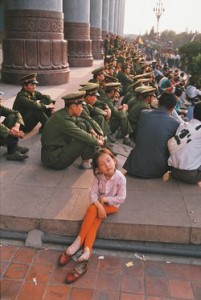2014-06-04

Protesters gather in Tiananmen Square in Beijing on June 2, 1989.
AFP
Rowena Xiaoqing He grew up as a member of the “Tiananmen generation” in China, Continue reading
2014-06-04

Protesters gather in Tiananmen Square in Beijing on June 2, 1989.
AFP
Rowena Xiaoqing He grew up as a member of the “Tiananmen generation” in China, Continue reading
Interview: ‘Tiananmen Didn’t End in 1989’已关闭评论
Posted in June 4th Commemoration, Publications
Tagged June 4th, Tiananmen, Xiaoqing He
Ian Johnson JUNE 5, 2014 ISSUE
The People’s Republic of Amnesia: Tiananmen Revisited
by Louisa Lim
Oxford University Press, 248 pp., $24.95
Tiananmen Exiles: Voices of the Struggle for Democracy in China
by Rowena Xiaoqing He
Palgrave Macmillan, 212 pp., $95.00; $29.00 (paper)

Ken Jarecke/Contact Press Images
Chinese troops observing the Tiananmen Square demonstration in May 1989 before the army was ordered to attack
Every spring, an old friend of mine named Xu Jue makes a trip to the Babaoshan cemetery in the western suburbs of Beijing to lay flowers on the tombs of her dead son and husband. She always plans her visit for April 5, which is the holiday of Pure Brightness, or Qingming. The traditional Chinese calendar has three festivals to honor the dead and Qingming is the most important—so important that in 2008 the government, which for decades had tried to suppress traditional religious practices, declared it a national holiday and gave people a day off to fulfill their obligations. Nowadays, Communist Party officials participate too; almost every year, they are shown on national television visiting the shrines of Communist martyrs or worshiping the mythic founder of the Chinese people, the Yellow Emperor, at a grandiose monument on the Yellow River.
But remembering can raise unpleasant questions. A few days before Xu Jue’s planned visit, two police officers come by her house to tell her that they will do her a special favor. They will escort her personally to the cemetery and help her sweep the tombs and lay the flowers. Their condition is that they won’t go on the emotive day of April 5. Instead, they’ll go a few days earlier. She knows she has no choice and accepts. Each year they cut a strange sight: an old lady arriving in a black sedan with four plainclothes police officers, who follow her to the tombstones of the dead men in her life.
Ian Johnson:The Ghosts of Tiananmen Square已关闭评论
Posted in Book Reviews, Headlines, June 4th Commemoration
Tagged June 4th, Tiananmen, Xiaoqing He
Posted on May 15, 2014 by Maura Cunningham
He coverNow up at the Wall Street Journal’s China Real Time Report blog, my new column on Rowena Xiaoqing He’s recent book, Tiananmen Exiles:
In “Tiananmen Exiles,” Ms. He interviews Shen Tong and Wang Dan, both important figures in the Beijing protest movement, as well as Yi Danxuan, who was a student leader in Guangzhou. All three live overseas (only Mr. Shen has been able to visit China for business, on the condition that he refrain from political activity), and all have been prominent members of the Tiananmen exile community. Wang Dan obtained a Ph.D. in Chinese history from Harvard and now teaches in Taiwan, while Shen Tong founded a software company and Yi Danxuan has worked in journalism and business. Both Mr. Shen and Mr. Yi live in the United States.
Wall Street Journal: Tiananmen Amnesia and Tiananmen Exiles已关闭评论
Posted in Book Reviews, June 4th Commemoration
Tagged June 4th, Tiananmen, Tiananmen Exiles, Xiaoqing He
Tiananmen Exiles:Voices of the Struggle for Democracy in China Palgrave Studies in Oral History
Rowena Xiaoqing He and Foreword By Perry Link
Palgrave Macmillan, April 2014
ISBN: 978-1-137-43831-7, ISBN10: 1-137-43831-2,
6.000 x 9.250 inches, 240 pages,
In the spring of 1989, millions of citizens across China took to the streets in a nationwide uprising against government corruption and authoritarian rule. What began with widespread hope for political reform ended with the People’s Liberation Army firing on unarmed citizens in the capital city of Beijing, and those leaders who survived the crackdown became wanted criminals overnight. Among the witnesses to this unprecedented popular movement was Rowena Xiaoqing He, who would later join former student leaders and other exiles in North America, where she has worked tirelessly for over a decade to keep the memory of the Tiananmen Movement alive.
Tiananmen Exiles:Voices of the Struggle for Democracy in China Palgrave Studies in Oral History已关闭评论
Posted in Book Reviews, June 4th Commemoration, News & Events, Special Topics
Tagged Jnue 4th, Perry Link, Tiananmen Exiles, Xiaoqing He